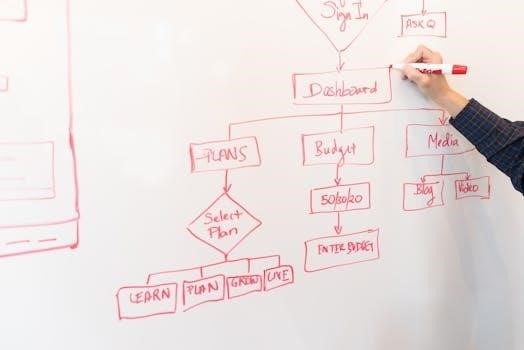Project Management⁚ The Managerial Process 8th Edition Overview
This 8th edition provides a comprehensive look at project management. It integrates human aspects and organizational culture with essential tools and methods. The book emphasizes a realistic approach to project execution‚ covering project lifecycles and leadership skills.

Authors and Publication
The 8th edition of “Project Management⁚ The Managerial Process” is authored by Erik W. Larson and Clifford F. Gray. These authors are well-known in the field of project management‚ bringing their expertise to this widely used textbook. The book is published by McGraw-Hill Education‚ a reputable academic publisher recognized for its high-quality educational resources. The publication date of this edition is around 2020-2021. This edition is part of the McGraw-Hill Series in Operations and Decision Sciences. The book is available in both print and digital formats‚ catering to various learning preferences. It is a widely used textbook in both undergraduate and graduate project management programs across multiple institutions. The digital versions include eBook‚ PDF‚ and ePub formats‚ making it accessible across different devices. The book’s popularity is reflected in its availability through many online bookstores and educational platforms. It has also been published as an International Edition.
Core Concepts of the Book
The core concepts of “Project Management⁚ The Managerial Process‚ 8th Edition” revolve around providing a holistic and realistic approach to project management. It emphasizes not only the tools and techniques used in project management but also the human dimension and organizational culture. The book integrates both the technical aspects and the interpersonal skills necessary for effective project execution. Key concepts include understanding the project lifecycle‚ from initiation to closure‚ and the importance of stakeholder management. It focuses on the skills required to propose‚ plan‚ secure resources‚ budget‚ and lead project teams. The book stresses the managerial process‚ focusing on how to successfully manage projects‚ rather than solely on the technical details. It also aims to equip readers with the necessary knowledge to understand project selection and organizational strategies. The text highlights the balance between technical expertise and human dynamics in achieving project success.
Holistic Approach to Project Management
The 8th edition of “Project Management⁚ The Managerial Process” advocates for a holistic approach‚ emphasizing that successful project management involves more than just technical skills. This approach integrates the human element and organizational culture into the project management process. It recognizes that projects are not solely about deadlines and budgets‚ but also about people and their interactions. This holistic view considers how organizational structures and cultures influence project success. It covers the importance of understanding and managing project teams effectively‚ including leadership and communication skills. Furthermore‚ the text integrates various aspects like the social and technical dimensions of project management‚ highlighting the need to balance these elements. This approach emphasizes that project managers need to be adept at both technical methodologies and interpersonal dynamics to achieve the desired outcomes. The book provides a balanced perspective‚ ensuring project managers grasp all the complexities involved in the project management lifecycle‚ including the human element‚ for effective and successful project delivery.

Key Topics Covered in the 8th Edition
This edition delves into critical areas like the project lifecycle‚ stakeholder management‚ scheduling‚ and resource allocation. It also thoroughly covers risk management‚ equipping readers with essential project management skills.
Project Lifecycle
The 8th edition of “Project Management⁚ The Managerial Process” thoroughly explores the project lifecycle‚ which is a fundamental concept in project management. The book details each phase‚ from initiation to closure‚ emphasizing the unique activities and considerations at each stage. It covers how projects move through different phases‚ such as defining the project scope‚ estimating timelines and costs‚ and developing a project schedule. This edition also highlights the importance of understanding the flow of a project from beginning to end for effective planning and execution. It further elaborates on how to manage project constraints and maintain control throughout the various stages of the project lifecycle. The book provides a clear explanation of the project lifecycle‚ including initiation‚ planning‚ execution‚ monitoring‚ and closure phases‚ with specific emphasis on the human dimension and the socio-technical views of projects. It also offers insight into how to successfully complete projects by securing resources‚ managing budgets‚ and leading project teams through each phase of the lifecycle. The text not only provides a description of the process‚ but practical examples for each of the stages.
Stakeholder Management
Effective stakeholder management is a key focus in the 8th edition of “Project Management⁚ The Managerial Process.” This section emphasizes that successful project outcomes heavily rely on understanding and managing the various individuals and groups involved. The book provides strategies for identifying stakeholders and analyzing their interests‚ influence‚ and potential impact on the project. It stresses the need to proactively communicate with stakeholders‚ keeping them informed about project progress and any challenges. The text also delves into techniques for resolving conflicts and building strong relationships to ensure stakeholder buy-in and support. This part of the book highlights the importance of engaging stakeholders throughout the project lifecycle‚ from the initial planning stages to final delivery. It offers practical guidance on how to tailor communication styles to meet the specific needs of different stakeholder groups. Moreover‚ the book stresses that effective stakeholder engagement contributes to more realistic project planning and a higher chance of successful project completion by managing expectations and fostering collaboration among all parties involved.

Scheduling and Resource Allocation
The 8th edition of “Project Management⁚ The Managerial Process” dedicates a significant portion to scheduling and resource allocation‚ crucial for successful project execution. This section provides in-depth techniques for creating realistic project schedules‚ including the use of tools like Gantt charts and network diagrams. The text emphasizes the importance of accurately estimating task durations and identifying dependencies to create a practical timeline. It also tackles the complex process of resource allocation‚ covering both human resources and materials. The book offers methods for optimizing resource use‚ minimizing conflicts‚ and ensuring that resources are available when needed. It explores strategies for dealing with resource constraints and balancing competing project demands. Moreover‚ the text discusses how to monitor and adjust schedules and resource allocations as projects progress. It provides guidance on using project management software to facilitate this process and emphasizes that effective scheduling and resource allocation are essential for delivering projects on time and within budget. This part of the book offers practical insights into managing these critical elements of project management.
Risk Management
The 8th edition of “Project Management⁚ The Managerial Process” thoroughly addresses risk management‚ highlighting its critical role in project success. This section emphasizes identifying‚ analyzing‚ and responding to potential risks throughout the project lifecycle. The book provides techniques for risk assessment‚ including qualitative and quantitative methods. It covers tools such as risk matrices and probability impact assessments‚ assisting project managers in prioritizing risks effectively. The text also delves into the development of risk response strategies‚ such as avoidance‚ mitigation‚ transfer‚ and acceptance. Furthermore‚ it discusses the importance of creating risk registers and continuously monitoring risks. It stresses the need for proactive risk management‚ encouraging project teams to identify potential issues early to minimize negative impacts. This section of the book provides a practical guide for managing project uncertainties and ensures that project managers are well-equipped to handle risks throughout their projects. The text also emphasizes the importance of contingency planning‚ ensuring preparedness for unforeseen events and providing a comprehensive approach to project risk.

Editions and Formats
The 8th edition is available in various formats‚ including print‚ eBook‚ PDF‚ and ePub. Digital options offer flexibility for readers. Loose-leaf versions also provide another choice for studying the book.
Print and Digital ISBNs
The 8th edition of “Project Management⁚ The Managerial Process” has distinct ISBNs for its print and digital versions. The print ISBNs include 9781260570434 and 1260570436‚ while the digital and eTextbook ISBNs are 9781260579567 and 1260579565. These ISBNs help in easily identifying and procuring the correct edition of the book‚ whether in physical or electronic format. These numbers are crucial for libraries‚ bookstores‚ and students when ordering or searching for the text. The availability of different ISBNs is essential for inventory management and ensuring that customers receive the version they intend to purchase. These unique identifiers confirm the correct edition and format.
Availability in Multiple Formats (eBook‚ PDF‚ ePub‚ Loose Leaf)
The 8th edition of “Project Management⁚ The Managerial Process” caters to diverse learning preferences with its availability in multiple formats. It’s offered as an eBook‚ providing convenient digital access for readers. The PDF format is also available for those who prefer a static document. The ePub version allows for a more flexible reading experience‚ particularly on mobile devices. Additionally‚ a loose-leaf version of the book is available. These varied formats ensure that users can choose the option that best suits their individual needs and study habits. This flexibility allows for easy access on different devices and platforms. This broad range of formats increases accessibility and convenience for students and professionals alike.
